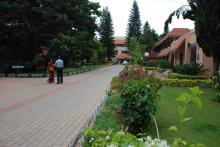
Abstract: This paper attempts to understand the predicaments of the fishers living in the coastal area of Mumbai in relation to plastic, both for its use value as well as waste value. By using the sociological concepts of ‘life-world’ and ‘life chances’, this paper argues that the supposed indispensability of plastics in the lives of the fishers is connected to the statist policies of modernisation of fisheries in the post 1970s and the changing narratives of hygiene and safety in the policies and politics of the industrialised west. Because of commercialisation and modernisation drives, cotton nets were replaced by heavy duty nylon nets and bamboo baskets were replaced by plastic crates, similarly, cloth and jute carry bags were replaced by polythene bags. Therefore, it is necessary to understand the socially constructed aspects of plastic to articulate the dicey situation of the Koli fishers of Mumbai.
About the Speaker: Lalatendu Keshari Das is a sociologist and primarily works at the intersections of resource politics, political sociology and political ecology. He is currently an Assistant Professor in the Department of Humanities and Social Sciences at IIT Roorkee.
